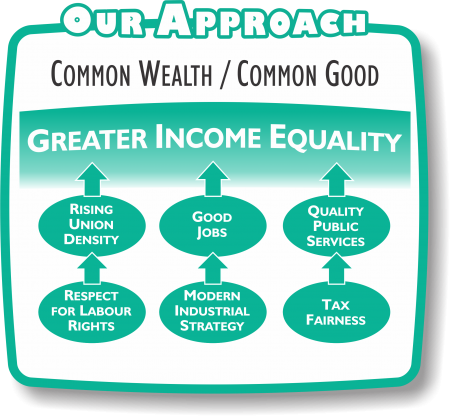LITTLE DICTATORS
Granting bosses the power to rule over us

MILLIONS OF US LEAVE DEMOCRACY BEHIND EVERY DAY. We go to work.
Once there, most of the rights and freedoms we hold to be so precious to us off the job just evaporate. This doesn’t seem to matter. The boss gets to behave like a little dictator. Not noticing is expected. Ya gotta go along to get along.
Employers can dictate how we dress, what politicians we support, what we’re allowed to say on social media, even what we do with our free time.
Employers today exert a degree of authority over their employees that, in many cases, is more restrictive than the authority that the state wields over its citizens.
Elizabeth Anderson explores all this in her book Private Government: How Employers Rule Our Lives (and Why We Don’t Talk About It).
It is perfectly legal, Anderson notes, for Tyson Foods to refuse its poultry-plant workers bathroom breaks, or for Apple to rifle through the belongings of its retail staff on a daily basis, causing them to lose up to half an hour of their unpaid personal time waiting to be searched.
It is also perfectly normal for employers to surveil workers’ communications, to order them to undergo medical testing, or to punish them for their political preferences. And yet, as Anderson points out, “if the U.S. government imposed such regulations on us, we would rightly protest that our constitutional rights were being violated.”
As many as 80 percent of workers in the United States, Anderson claims, are “subject to dictatorship at work.” About a quarter already explicitly describe their workplaces as such, and those who don’t are “one arbitrary and oppressive managerial decision away” from understanding how painfully thin their rights at work are.
From mundane to deranged
The discretion exercised by managers daily ranges from the mundane (your supervisor screaming at you for not responding to his e-mail within minutes, but taking days to respond to yours) to the deranged (the foremen at an Amazon warehouse in Pennsylvania who refused to open the doors and allow air circulation on a hot day for fear of theft, preferring instead to let assembly-line workers collapse from heatstroke).
American bosses have also fired workers for smoking off the clock and for having premarital sex.

Juli Briskman was fired after a photograph of her raising a middle finger to President Trump’s passing motorcade went viral.
Even after workers leave a job, they often remain tethered to the whims of their former bosses. This is particularly true in white-collar and creative professions, where references from past employers are usually required for securing new employment, and workers are therefore obligated to maintain friendly relationships with former bosses.
These cases demonstrate the fundamental inequality of the employment relation itself. Something that only gets worse if you are a woman.
In the majority of the incidents that have come to light, the victims’ second-class status as women has been deeply entangled with their second-class status as employees.
Boss abuse includes sexual abuse and a lot more
But, Anderson warns against losing the focus on the illegitimate power of bosses in the issue of the power of men over women.
As Anderson points out, even absent sexual offenses, employers can and often do “demote employees; cut their pay; assign them inconvenient hours or too many or too few hours; assign them more dangerous, dirty, menial, or grueling tasks; increase their pace of work; set them up to fail; and, within very broad limits, humiliate and harass them.”
The obvious truth is that none of this is exceptional. It clearly is a fair and accurate account of the distorted power dynamic that makes up day to day “life on the job” in most workplaces.
So, what do workers need to do to liberate themselves from dictator bosses? Getting angry about it would be a good start. Look what rising up angry has finally done to advance women’s rights.
We must get angry about being treated as second class citizens at work, denied all our civil rights and civil liberties. We must make the inherent injustice of the workplace an issue, in and of itself—an issue that touches us all as citizens of a democracy, an issue that we can no longer universally ignore, nor limit to whatever unions may, or may not, choose to do about it.
Just because we go into work should not mean we have to leave our basic democratic rights and freedoms behind.












Add new comment